RESEARCH PUBLICATIONS
To see how various effects of the We Inspire Smart Eating curriculum have been tested, click on a title below.
For a complete bibliography of journal publications, click here
Whiteside-Mansell, L. & Swindle, T. (2017, June). Together We Inspire Smart Eating: A Preschool WISE curriculum for
obesity prevention in low-income families. Journal of Nutrition Education and Behavior,
49(9) pp. 789-792 DOI informati on: 10.1016/j.jneb.2017.05.345
This study found educators implementing Together, We Inspire Smart Eating (WISE) increased nutrition knowledge after WISE training.
Educator knowledge was still high at the end of the school year. In the training, educators discuss their role in child nutrition,
how their history with foods is linked to teaching WISE, and examine classroom-nutrition best practice.
In this study, 56 educators from 20 Head Start, 13 Kindergarten, and 15 First Grade class rooms attended WISE training.

Whiteside-Mansell, L., & Swindle, T. (2018). Evaluation of Together We Inspire Smart Eating: Preschool fruit and vegetable consumption. Health Education Research, 34(1), 62-71. DOI: 10.1093/her/cyy048 https://academic.oup.com/her/article/34/1/62/5253829
Together, We Inspire Smart Eating (WISE) is a preschool nutrition program intended to increase the amount of fruits and vegetables eaten at home. We used information from families at 15 Head Start centers. Six centers used the WISE program and 9 did not (the comparison group). All children had weekly food experiences, but the teachers in the control group did not use WISE and picked activities and food for the food experience themselves. Parents were interviewed by their child’s teacher before the program started and after it ended.
Children in WISE centers ate less sugary sweets at the end of the year than children who were not in WISE centers. Parents reported that their children in WISE classes ate more vegetables at the end of the school year than parents with children not in WISE classes. Parents of children in WISE reported seeing their child eat WISE fruits more often as well. We also considered what parents reported they were eating before the school year.

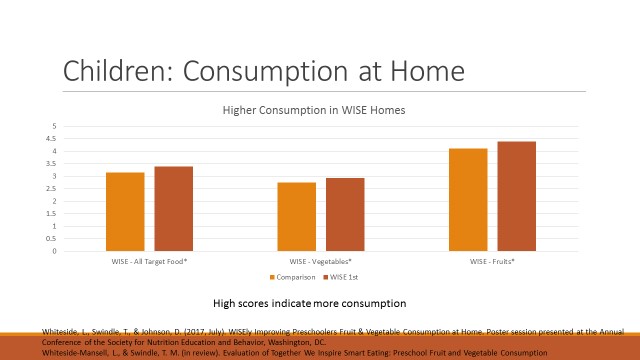
Table Talk : An Observational Tool of Nutrition Best Practice
Swindle, T., Rutledge, J., Dix, B., & Whiteside-Mansell, L. (2017). Table Talk: Development of an observational tool to assess verbal
feeding communications in early care and education settings.
Public Health Nutrition, 20(16), 2869-2877. doi:10.1017/S1368980017001896
Researchers often need to measure factors that affect children’s diet. Validated tools to do this are critical to create and assess interventions to improve children’s diets. Talk observation tool were based on: (a) the benefits of vocal, positive adult role, (b) the counterproductive impact of pressuring children to eat, (c) the value of guiding children to attune to cues of hunger and satiety and valuing children’s choice to eat, (d) the benefits of appropriate food exploration and encouraging children’s interest in foods, (e) the undesirable impacts (i.e., over justification effect) of coercive feeding practices such as promise of a food to increase intake of another food and (f) the advantage of a positive social context at mealtimes. This study identified two high use unsupportive areas for programs to target: pressure and overuse of firm controlling language. For researchers, Table Talk will be useful in assessing verbal feeding communications of educators. It has been used to describe the preschool mealtime environment. Researchers interested in using this tool should obtain rigorous training to assure the tool.

Facebook: The Use of Social Media to Engage Parents in a Preschool Obesity Prevention Curriculum
Swindle, T. M., Ward, W. L., & Whiteside-Mansell, L. (2018). Facebook: The Use of Social Media to Engage Parents in a Preschool Obesity Prevention Curriculum. Journal of Nutrition Education and Behavior, 50(1), 4-10.e1. https://doi.org/10.1016/j.jneb.2017.05.344
using Facebook included a desire to see more posts from classroom teachers, lack of time, and misunderstanding about privacy protections.
Perceived usefulness of the content and social support were factors that made parents want to use Facebook. Facebook was found to be a
useful platform to provide nutrition education and assisted with different levels of parent engagement.

Pediatric Nutrition: Parenting Impacts Beyond Financial Resources Swindle, T., Ward, W. L., Whiteside-Mansell, L., Brathwaite, J., Bokony, P.A., Conners-Burrow, N, & McKelvey, L.M. (2014). Pediatric nutrition: Parenting impacts beyond financial resources. Clinical Pediatrics, 53(8), 797-799. doi 10.1177/0009922813505904.
We put forward that parenting behaviors, not just finances, will predict fruit and vegetable intake in a low-income group 446 families in a state-funded, urban preschool program were interviewed using the Family Map by their child’s teacher during their parent-teacher conference in the fall semester. In terms of impact on fruit and vegetable intake, 4 factors were considered: Financial Need, Parent Interaction with Child, Parent School Readiness Promotion, and Parental Provision of Experiences. Results show that fruit/vegetable consumption is below recommended levels in low-income children. Parenting behaviors were more predictive of child fruit/vegetable intake than financial need. This suggests that education and counseling of parenting behaviors during wellness visits are critical for fruit/vegetable intake.

Food Insecurity: Validation of a Two-Item Screen Using Convergent Risk
Swindle, T. Whiteside-Mansell, L., McKelvey, L. (2012). Food Insecurity: Validation of a two-item screen using convergent risks. Journal of Child and Family Studies. 22 (7), 932-941. doi:10.1007/s10826-012-9652-7
To stop the harmful effects of food insecurity (or lack of access to nutritious food), a well-organized and valid screen of food insecurity is needed for use by specialists such as childcare providers, home visitors, or other intervention program staff. This study provides evidence of validity for a 2-item screen for food insecurity as conducted by childcare providers. The Early Childhood Family Map inventory (EC-FM) was used in home visits with Head Start families. Early childcare teachers from 27 Head Start sites completed the EC-FM interview during fall home visits. Results showed that low-income food insecurity families found with the 2-item Family Map screen were more likely than low-income food secure families to show increased trouble in getting basic needs, decreased physical and mental health, decreased environmental safety, and increased harsh discipline, parenting stress, and family conflict.

Summary on Structured Food Experiences: A Preliminary Evaluation of the WISE Curriculum
Swindle, T., & Whiteside-Mansell, L. (2014). Structured Food Experiences: A Preliminary Evaluation of the WISE Curriculum. Journal of Nutrition Education and Behavior, 46(4), S133
This study presents the preliminary findings of the food experience curriculum for Together, We Inspire Smart Eating (WISE). The data suggests that using food activities at school and keeping parents connected can help change children’s diets at home.
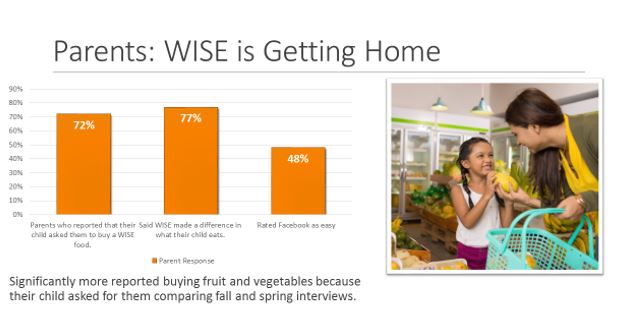
Swindle, T., Ward, W. L., Bokony, P., Pettit, D., & Whiteside-Mansell, L. (2014). Technology Use and Interest among Low-Income Parents of Young Children: Differences by Age Group and Ethnicity". Journal of Nutrition Education and Behavior, 46(6), 484-90. DOI: 10.1016/j.jneb.2014.06.004
Technology may be used to engaged with low-income parents/caregivers. This study examined whether technology is a useful and preferred method for receiving information in low-income parents/caregivers. The most popular daily technology uses were for cell phones for calls. More than half of participants used e-mail daily. Most participants (60%) wanted information to come through e-mail. Facebook, e-mail, texting, and smartphone apps may be used to connect with low-income parents and caregivers aged 45 or lower.
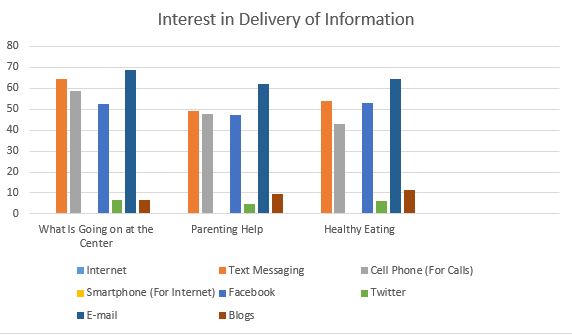
Evidence-Based Obesity Prevention in Childcare: A cluster Randomized Hybrid Type III Trial
Swindle, T., Johnson, S.L., Whiteside-Mansell, L., & Curran, G. (2017, July). A mixed methods protocol for developing and testing implementation strategies for evidence-based obesity prevention in childcare: A cluster randomized hybrid type III trial. Implementation Science, 12:90 DOI: 10.1186/s13012-017-0624-6
This study describes a three-phase approach to creating and testing implementation strategies to support evidence-based practices for obesity prevention in childcare.
- Use an Evidence-Based Quality Improvement process to match barriers/helpers to WISE operation with possible strategies to improve truthfulness to WISE core factors, custom-made strategies to an early childhood setting serving families in poverty, and finalize the enhanced implementation strategy for WISE.
- Use a Hybrid Type III Cluster Randomized Design to test the usefulness of the enhanced implementation strategy while also assessing impacts of the intervention on child outcomes.
Along with the 3 aims, RE-AIM uses an evaluation outline to assess reach, effectiveness, adoption, implementation, and maintenance of intervention programs. The study provides an example of a systematic process to develop and test a custom-made, enhanced implementation strategy.
Early Childhood Educators’ childhood and Current Food Insecurity and Dietary Intake Swindle, T. M., Ward, W. L., Bokony, P., & Whiteside-Mansell, L. (2018). A Cross-Sectional Study of Early Childhood Educators’ Childhood and Current Food Insecurity and Dietary Intake. Journal of Hunger & Environmental Nutrition, 13(1), 40–54. https://doi.org/10.1080/19320248.2016.122775
Research suggests that ECE behaviors towards food (rushing meals, pressuring children to eat, etc.)
are not considered best practices. This study focused on a few possibly meaningful factors for ECE behavior.
307 Early childhood educators (ECEs) completed an 18-item survey on their role (lead vs. assistant), education level,
program type, and current and childhood food insecurity and dietary intake.
This study reported poor diet quality and a high rate of food insecurity.
Current intake shows that 25% of ECEs eat fruits and vegetables more than once per day. About 35% indicated current food
insecurity and about 29% had experienced food insecurity as a child. Future training and educations efforts for ECEs should consider
using specific resources to assess and lower ECE food
insecurities and give support for healthy eating on a budget.
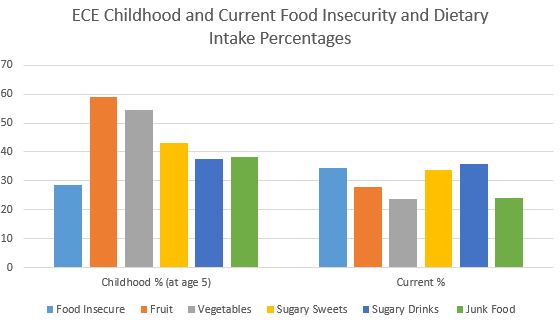
Together We Inspire Smart Eating: Pre-School Fruit and Vegetable Consumption
Whiteside-Mansell, L., & Swindle, T. (2018). Evaluation of Together We Inspire Smart Eating: Preschool fruit and vegetable consumption. Health Education Research, 34(1), 62-71. DOI: 10.1093/her/cyy048 https://academic.oup.com/her/article/34/1/62/5253829
This study the examined nutrition intervention Together We Inspire Smart Eating (WISE). Results show that children in WISE centers ate healthier food at home than children not in WISE classrooms. This suggests that WISE works to improve children’s diets in at-risk environments.
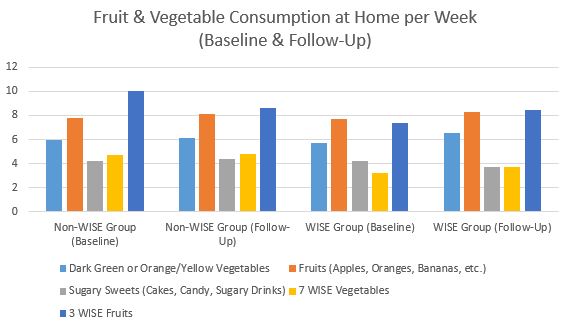
Low Fruit/Vegetable Consumption in the Home Ward, W. L., Swindle, T., Kyzer, A., Whiteside-Mansell, L. (2015). Low Fruit/Vegetable Consumption in the Home: Cumulative Risk Factors in Early Childhood. Early Childhood Education Journal. Advance online publication. doi: 10.1007/s10643-014-0661-6
Results from this study support previous work that family resources matter. Our findings suggest that parenting behaviors and parent/child interactions should be considered as main targets for intervention efforts. Ineffective parenting in areas of routines, interactions, and monitoring were tied to 3 times the greater risk for fruit and vegetable consumption.
The study suggests that fruit and vegetable consumption is not based simply on basic resources of the family, but also on other factors related to parental monitoring and parent engagement.

Nutrition Experiences of Early Childhood Educators
Swindle, T., Whiteside-Mansell, L., Bokony, P., & Ward, W. (2014). Nutrition Experiences of Early Childhood Educators: Current and Retrospective Reports. Journal of Nutrition Education and Behavior, 46(4), S172.
This study seeks to describe childhood and current nutrition experiences of early childcare educators (ECE) and explore the relationship between these experiences and ECE beliefs. ECE are primary role models for healthy eating and food attitudes for young children. Sadly, classroom behaviors are not always in line with best practice activities. This research is an important step toward understanding the underlying reasons for these behaviors and to creating informed strategies for prevention.

A Case Study of the WISE Intervention Swindle, T., Selig, J., Rutledge, J.M., Whiteside-Mansell, L., & Curran, G. (2018). Fidelity Monitoring in Complex Interventions: A Case Study of the WISE Intervention. Archives of Public Health, 76:53 https://doi.org/10.1186/s13690-018-0292-2
This study uses data evaluating the preschool nutrition education intervention, Together, We Inspire Smart Eating (WISE), to explore issues of source, timing, and frequency of fidelity (or truthful) monitoring. . Fidelity elements that were assessed were: Hands-On Exposure, Use of Mascot (Windy Wise), and Role Modeling
Results show that, on average, observed and self-reports may seem consistent even with weak
connections and individual cases of extreme over reporting by those carrying out the intervention.
The nature of the component where fidelity is being monitored and the timing in the context of the intervention
are important when selecting the type of assessment and frequency of fidelity monitoring.
